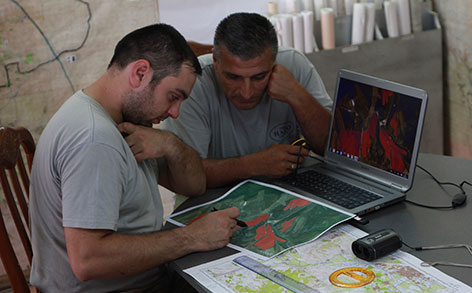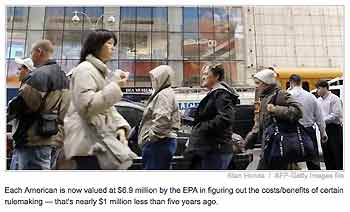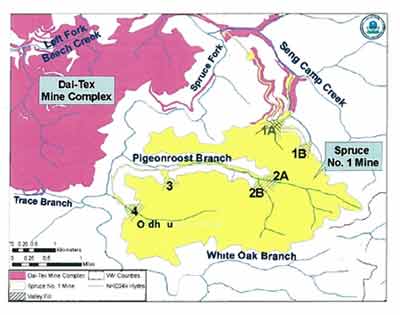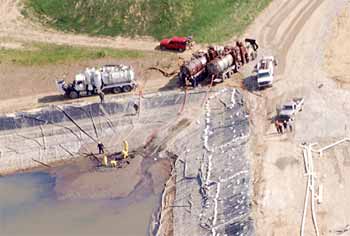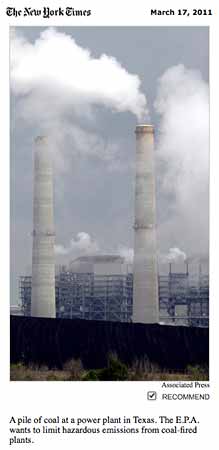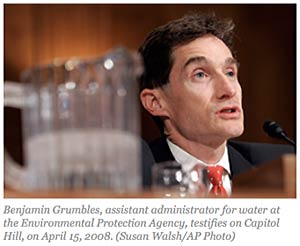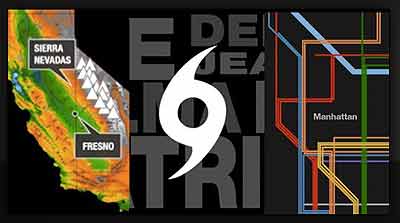Contains the keyword press
Google and a New York financial firm have each agreed to invest heavily in a proposed $5 billion transmission backbone for future offshore wind farms along the Atlantic Seaboard that could ultimately transform the region’s electrical map.
The 350-mile underwater spine, which could remove some critical obstacles to wind power development, has stirred excitement among investors, government officials and environmentalists who have been briefed on it.
The system’s backbone cable, with a capacity of 6,000 megawatts, equal to the output of five large nuclear reactors, would run in shallow trenches on the seabed in federal waters 15 to 20 miles offshore, from northern New Jersey to Norfolk, Va. The notion would be to harvest energy from turbines in an area where the wind is strong but the hulking towers would barely be visible.
See: Plug into a Greener Grid: RE<C
Google.org is working towards a clean energy future in a variety of ways: We're working on developing utility scale renewable energy cheaper than coal (RE<C) and accelerating the commercialization of plug-in vehicles through the RechargeIT project. Our over-arching vision is to one day transform the global economy from one running on fossil fuels to one largely based on clean energy. Our Clean Energy 2030 plan offers a potential path to do just that.
Google Earth platform to simplify siting of clean energy
See: Google Earth Outreach Showcase
See: Appalachian Voices My Connection
See: Appalachian Mountaintop Removal Tour
See: Marsh Fork Elementary: Journey Up Coal River | A Community and Strip Mining
See: Mountaintop Removal (Film)
See: Tree spiker : from Earth First! to lowbagging: my struggles in radical environmental action
See: Bluedaze. Mountain Top Removal for Hydraulic Fracturing Sand
YES! Magazine reframes the biggest problems of our time in terms of their solutions. Online and in print, we outline a path forward with in-depth analysis, tools for citizen engagement, and stories about real people working for a better world.
Partners:
grist.org
Corporate Accountability International
Klean Kanteen
350.org
Green for All
Barefoot College of Tilonia
Small Planet Institute
Bainbridge Graduate Institute
Common Cause
Center for a New American Dream
WASHINGTON — As the players here remake the nation’s vast regulatory system, they have been grappling with a subject that is more the province of poets and philosophers than bureaucrats: what is the value of a human life?
The answer determines how much spending the government should require to prevent a single death.
To protests from business and praise from unions, environmentalists and consumer groups, one agency after another has ratcheted up the price of life, justifying tougher — and more costly — standards...
...The Environmental Protection Agency set the value of a life at $9.1 million last year in proposing tighter restrictions on air pollution. The agency used numbers as low as $6.8 million during the George W. Bush administration.
The Food and Drug Administration declared that life was worth $7.9 million last year, up from $5 million in 2008, in proposing warning labels on cigarette packages featuring images of cancer victims.
The Transportation Department has used values of around $6 million to justify recent decisions to impose regulations that the Bush administration had rejected as too expensive, like requiring stronger roofs on cars.
See: Climate Co-benefits and Child Mortality Wedges | Fracking Resource Guide.
What is the value of a human life? Climate change is going to kill millions of children, does it matter that they're not yours?
See also: Associated Press. "How to value life? EPA devalues its estimate: $900,000 taken off in what critics say is way to weaken pollution rules." 2008-07-10.
...The U.S. Environmental Protection Agency has vetoed the largest single mountaintop removal permit in West Virginia history.
The move is part of an Obama administration crackdown aimed at reducing the effects of mountaintop removal coal-mining on the environment and on coalfield communities in Appalachian — impacts that scientists are increasingly finding to be pervasive and irreversible.
The final EPA decision document is available here. EPA has also now posted some appendices to that document, including a response to comments.
EPA officials this morning were alerting West Virginia’s congressional delegation to their action, and undoubtedly preparing for a huge backlash from the mining industry and its friends among coalfield political leaders.
Comment (65 comments posted as of 1/14/11 1:04 P.M.) posted by rhmooney3. Jan. 13, 2011 at 1:33 P.M.
...I believe the mining industry, the entire business community and all the states want this to move through the federal courts to the U.S. Supreme Court...
P.S. As a result of this EPA action, mining companies have no choice than to play ball with the EPA — in making this decison the EPA has made a lot of other decisions yet to come.
W.Va. Senator Joe Manchin said:
Today’s EPA decision is not just fundamentally wrong, it is an unprecedented act by the federal government that will cost our state and our nation even more jobs during the worst recession in this country’s history.
While the EPA decision hurts West Virginia today, it has negative ramifications for every state in our nation, and I strongly urge every Senator and every Member of Congress to voice their opposition.

Peter S. Silva, EPA’s Assistant Administrator for Water
EPA Press Release:
CONTACT:
Jalil Isa (News Media Only)
isa.jalil@epa.gov
202-564-3226
202-564-4355
FOR IMMEDIATE RELEASE
January 13, 2011
EPA Halts Disposal of Mining Waste to Appalachian Waters at Proposed Spruce Mine: Agency cites irreversible damage to clean water, environment in the region.
WASHINGTON – After extensive scientific study, a major public hearing in West Virginia and review of more than 50,000 public comments, the U.S. Environmental Protection Agency (EPA) today announced that it will use its authority under the Clean Water Act to halt the proposed disposal of mining waste in streams at the Mingo-Logan Coal Company’s Spruce No. 1 coal mine.
Background on Clean Water Act Section 404(c)
Clean Water Act Section 404(c) authorizes EPA to restrict or prohibit placing dredged or fill material in streams, lakes, rivers, wetlands and other waters if the agency determines that the activities would result in “unacceptable adverse effects” to the environment, water quality, or water supplies. This authority applies to proposed projects as well as projects previously permitted under the Clean Water Act although EPA is not considering such action for other previously permitted projects.
With today’s (Jan. 13, 2011) action, EPA has exercised its Section 404(c) authority only 13 times in its history of the CWA. EPA recognizes the importance of ensuring that its Section 404(c) actions are taken only where environmental impacts are truly unacceptable and will use this authority only where warranted by science and the law.
Ken Ward Jr. says:
Arch Coal hasn’t responded to my query yet, but the New York Times has these comments from a company spokeswoman:
John Broder. Jan. 13, 2011. NYT. "Agency Revokes Permit for Major Coal Mining Project".
“We remain shocked and dismayed at E.P.A.’s continued onslaught with respect to this validly issued permit,” said Kim Link, the company’s spokeswoman. “Absent court intervention, E.P.A.’s final determination to veto the Spruce permit blocks an additional $250 million investment and 250 well-paying American jobs.”
“Furthermore, we believe this decision will have a chilling effect on future U.S. investment,” she added, “because every business possessing or requiring a permit under Section 404 of the Clean Water Act will fear similar overreaching by the E.P.A. It’s a risk many businesses cannot afford to take.”
Ken Ward, Jr. is a staff reporter for the Charleston Gazette, who has been nationally recognized for his writing on the coal mining industry. He is Chair of the Society of Environmental Journalists First Amendment Task Force, founded in 2002 to "to address freedom-of-information, right-to-know, and other news gathering issues of concern to the pursuit of environmental journalism."
See: WATER: Rulings Restrict Clean Water Act, Foiling E.P.A. | Mixplex
See: Lisa P. Jackson, EPA (lisapjackson) on Twitter | Mixplex
See: New WVU-Va Tech study links water quality and cancer deaths in West Virginia coalfields
See: Ecological integrity of streams related to human cancer mortality rates
Secretary of Energy Steven Chu has appointed a panel of seven scientific and environmental worthies to study the rapidly growing method of natural gas extraction known as hydraulic fracturing and to make recommendations about how it can be done more cleanly and more safely.
The group includes John Deutch, a former Central Intelligence Agency director; Kathleen McGinty, a former top White House environmental adviser; and Daniel Yergin, probably the best-known oil industry analyst in the country...
Broder's piece goes on to offer a smokescreen of protest by the right, but according to Dusty Horwitt of the Environmental Working Group, “An industry insider like John Deutch is completely unacceptable to lead this panel...It looks as if the Obama Administration has already reached the conclusion that fracking is safe.”
Dr. Chu announced his decision late Thursday. This being Washington, House Republicans immediately issued a press release denouncing the study as wasteful, duplicative and yet another example of regulatory red tape run amok.
On the other side of the Capitol, Senator Richard Burr, Republican of North Carolina, went them one better, introducing a bill to dismantle the Department of Energy and the Environmental Protection Agency...
The EWG press release presents a clearer picture of the Administration's positioning and refers to a study by Duke University researchers, that found high concentrations of methane in 68 wells near shale-gas drilling and hydrofracking sites in northeastern Pennsylvania and New York, confirming property owners’ suspicions that gas extraction was leaking methane into their drinking water.
The "Paper of Record" has just as much a right as any blogger to present the facts or distort them.
In, "E.P.A. Proposes New Emission Standards for Power Plants", I caught the editors of the Times editing out an account of how Ms. Jackson invited a group of second graders from a nearby elementary school to the announcement. Earlier today, Mar. 17, it was edited out. Was it Broder and Rudolf, or the Times? Are children not newsworthy?
"She invited a group of second graders from a nearby elementary school to attend the rule’s unveiling at her agency."
Why did the Times delete it? The article as it first appears will always be located here. (PDF). The Google cache will expire as soon as you read this. See for yourself, read between the lines.
(Neil Zusman, 2011-03-17).
See: Clifford Krauss: propagandist par excellence
See: E.P.A. Proposes New Emission Standards for Power Plants
See: Scientific Study Links Flammable Drinking Water to Fracking
See: U.S. Congress. Committee on Space, Science, and Technology. "Hearing Highlights Lack of Objectivity in Draft EPA Fracking Study--No Evidence of Drinking Water Contamination from Fracking, Witnesses Say". May 11, 2011
Pennsylvania's natural gas drillers are still flushing vast quantities of contaminated wastewater into rivers that supply drinking water, despite major progress by the industry over the past year in curtailing the practice.
Photo: marcellus-shale.us
Under pressure from environmentalists and state officials, energy companies that have been drilling thousands of gas wells in the state's countryside spent part of 2010 overhauling the way they handle the chemically tainted and sometimes radioactive water that gushes from the ground after a drilling technique known as high-volume hydraulic fracturing, or fracking.
Until the second half of last year, Pennsylvania had been the only state to allow most of this wastewater to be discharged into rivers after only partial treatment. Other states required most or all of the brine to be disposed of by injecting it deep underground.
In recent months, though, the industry has boasted big gains in the amount of well wastewater that is reused, rather than trucked to treatment plants that empty into rivers and streams.
See: Articles on Fracking waste water.
See: Pittsburgh’s drinking water is radioactive, thanks to fracking. Only question is, how much?
WASHINGTON — The Environmental Protection Agency on Wednesday proposed the first national standard for emissions of mercury and other pollutants from coal-burning power plants, a rule that could lead to the early closing of a number of older plants and one that is certain to be challenged by the some utilities and Republicans in Congress...
Lisa P. Jackson, the agency’s administrator, said control of dozens of poisonous substances emitted by power plants was long overdue and would prevent thousands of deaths and tens of thousands of cases of disease a year.
Ms. Jackson pointedly included the head of the American Lung Association and two prominent doctors in her announcement to make the point that the regulations were designed to protect public health and not to penalize the utility industry.
Photograph: Jonathan Ernst/Reuters
Public health advocates said utilities had delayed the rules for more than two decades with court challenges and lobbying campaigns.
“If you think it’s expensive to put a scrubber on a smokestack, you should see how much it costs to treat a child over a lifetime with a birth defect,” said Dr. O. Marion Burton, president of the American Academy of Pediatrics, who stood with Ms. Jackson in announcing the rule.
Oddly, when the story first ran, it included an account of how Ms. Jackson invited a group of second graders from a nearby elementary school to the announcement. Earlier today, Mar. 17, it was edited out. Was it Broder and Rudolf, or the Times? Are children not newsworthy?
"She invited a group of second graders from a nearby elementary school to attend the rule’s unveiling at her agency."
I found a mention of it in a cached Google listing.
Why did the Times delete it? The article as it first appears will always be located here. (PDF). The Google cache will expire as soon as you read this. See for yourself, read between the lines.
(Neil Zusman, 2011-03-17).
The showdown between House Republicans and the White House over climate change and environmental policies kicks off Wednesday with EPA chief Lisa Jackson as the star witness.
The Energy and Commerce Committee will hold a hearing on legislation floated last week by Chairman Fred Upton (R-Mich.), Rep. Ed Whitfield (R-Ky.) and Sen. Jim Inhofe (R-Okla.) to strip the Environmental Protection Agency of its authority to regulate greenhouse gases under the Clean Air Act.
Jackson last week blasted what she called “draconian measures” aimed at handcuffing her agency, and insisted that the White House would veto legislation to take away its regulatory authority.
“These efforts would halt EPA’s common-sense steps under the Clean Air Act to protect Americans from harmful air pollution that until now has not been regulated at all from any sources in this country,” she said.
According to the American Journalism Review, Politico is a Washington, D.C. based website and newspaper that focuses on Beltway political coverage, started by veteran Washington Post political reporters John Harris and Jim VandeHei started in January 2007.
See: Glenn Greenwald. May 30, 2008. "The right-wing Politico cesspool". Salon.
I once thought that Politico would be a pernicious new addition to our rotted media culture. Instead, it actually provides a valuable service by packing every destructive and corrupt journalistic attribute, in its most vivid form, into one single cesspool.
See: Republicans ask court to toss climate case
See: Smackdown: climate science vs. climate economics
See: EPA in the Crosshairs | Mixplex
See: Beware The Green Dragon! | Right Wing Watch
See: Energy & Commerce Committee Investigates Potential Impacts of Hydraulic Fracturing
When Benjamin Grumbles was assistant administrator for water at the Environmental Protection Agency in the George W. Bush administration, he oversaw the release of a 2004 EPA report that determined that hydraulic fracturing was safe for drinking water. Then he watched as Congress used those findings to bolster the case for passing a law that prohibited the EPA from regulating fracking under the Safe Drinking Water Act.
In two interviews with ProPublica -- the first on June 29, 2009, soon after he left the EPA, and the second on March 5, 2011 -- Grumbles ponders the criticism leveled at the 2004 study and suggests that it's now time for Congress and the EPA to take another look at hydraulic fracturing. Our questions, and his answers, have been combined and edited for length to the version you see here.
Grumbles is currently on the board of the Clean Water America Alliance, a group focusing on water sustainability issues. He has also served as head of Arizona's Department of Environmental Quality.
Why don't Congressional climate change zombies see that climate change is a national security issue?
This website is a well-designed student journalism project that includes stories, interactive features, video, and links to documents.
According to a recent New York Times series, leaked EPA documents have exposed a decades-old effort to hide the dangers of natural gas extraction.
Nevertheless it's going full tilt without the scientific, objective regulation, and analysis that important security issues warrant, even though industry experts have known about the many risks it poses to the environment and our health for years. (Neil Zusman, 2011-03-11).
National Security Journalism Initiative
The Medill School of Journalism, a national leader in journalism education for decades, is now with the assistance of a generous McCormick Foundation grant expanding that leadership role into building a specialty, or a sequence of courses, into areas of national security journalism education.
See: A Life’s Value May Depend on the Agency, but It’s Rising







